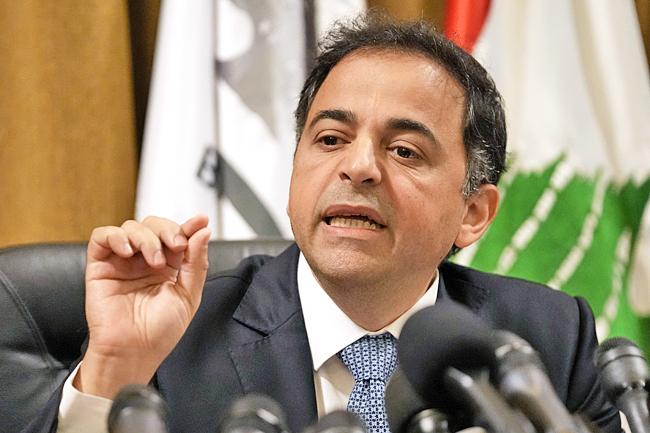BEIRUT (AP) – Lebanon’s interim central bank governor called on the country’s ruling class yesterday to quickly implement economic and financial reforms warning that the central bank won’t offer loans to the state and does not plan on printing money to cover the huge budget deficit to avoid worsening inflation.
Wassim Mansouri’s comments came nearly a month after he took over the leadership at the central bank after the term of his predecessor Riad Salameh ended on July 31.
Lebanon is in the grips of the worst economic and financial crisis in its modern history. Since the financial meltdown began in October 2019, the country’s political class – blamed for decades of corruption and mismanagement – has been resisting economic and financial reforms requested by the international community.
Since taking office, Mansouri has been urging the government to pass some reforms, cautioning that the central bank cannot continue to spend money to fund the government’s budget deficit.
“Every day we waste without drafting laws, losses increase as well as the possibility of a state collapse,” he said yesterday.

Mansouri added that the 2023 budget that was approved by the government last week had a 24-per-cent deficit while the central bank had asked for a deficit-free budget.
“The central bank will for sure not cover the deficit by lending the government neither in US dollars nor in Lebanese pounds,” Mansouri said. “Lebanese pounds will not be printed to cover the deficit because you know what this will lead to.”
He added that the state should pursue tax collection, reopen state institutions and put more control on what flows through its border for taxation, in an apparent reference to smuggling.
Mansouri said Lebanon’s economy has become cash-based since the crisis began, warning that this could have repercussions on the country in the future.
Two weeks ago, a forensic audit into Lebanon’s central bank by a New York-based company revealed years-long misconduct by the bank’s former governor Salameh and USD111 million in “illegitimate commissions”.
Alvarez and Marsal said the central bank’s “refusal to provide direct access to its systems and to allow work to be conducted” on its premises had “significantly delayed and slowed” the audit.
Mansouri said yesterday the central bank will cooperate with Alvarez and Marsal and hand over documents needed to the international company as well as Lebanon judicial authorities.



















































